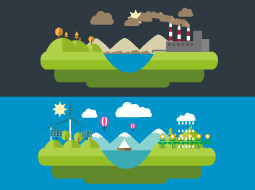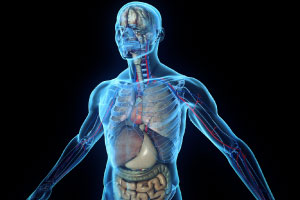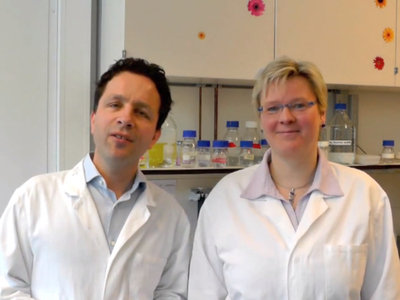Online courses directory (423)
Hank Green teaches you ecology!. The History of Life on Earth. Population Ecology: The Texas Mosquito Mystery. Human Population Growth. Community Ecology: Feel the Love. Community Ecology II: Predators. Ecological Succession: Change is Good. Ecosystem Ecology: Links in the Chain. The Hydrologic and Carbon Cycles: Always Recycle!. Nitrogen and Phosphorus Cycles: Always Recycle!. 5 Human Impacts on the Environment. Pollution. Conservation and Restoration Ecology. The History of Life on Earth. Population Ecology: The Texas Mosquito Mystery. Human Population Growth. Community Ecology: Feel the Love. Community Ecology II: Predators. Ecological Succession: Change is Good. Ecosystem Ecology: Links in the Chain. The Hydrologic and Carbon Cycles: Always Recycle!. Nitrogen and Phosphorus Cycles: Always Recycle!. 5 Human Impacts on the Environment. Pollution. Conservation and Restoration Ecology.
In this course you will develop and enhance your ability to think critically, assess information and develop reasoned arguments in the context of the global challenges facing society today.
Build your earth science vocabulary and learn about cycles of matter and types of sedimentary rocks through the Education Portal course Earth Science 101: Earth Science. Our series of video lessons and accompanying self-assessment quizzes can help you boost your scientific knowledge ahead of the Excelsior Earth Science exam . This course was designed by experienced educators and examines both science basics, like experimental design and systems of measurement, and more advanced topics, such as analysis of rock deformation and theories of continental drift.
Build your earth science vocabulary and learn about cycles of matter and types of sedimentary rocks through the Education Portal course Earth Science 101: Earth Science. Our series of video lessons and accompanying self-assessment quizzes can help you boost your scientific knowledge ahead of the Excelsior Earth Science exam . This course was designed by experienced educators and examines both science basics, like experimental design and systems of measurement, and more advanced topics, such as analysis of rock deformation and theories of continental drift.
Build your earth science vocabulary and learn about cycles of matter and types of sedimentary rocks through the Education Portal course Earth Science 101: Earth Science. Our series of video lessons and accompanying self-assessment quizzes can help you boost your scientific knowledge ahead of the Excelsior Earth Science exam . This course was designed by experienced educators and examines both science basics, like experimental design and systems of measurement, and more advanced topics, such as analysis of rock deformation and theories of continental drift.
Build your earth science vocabulary and learn about cycles of matter and types of sedimentary rocks through the Education Portal course Earth Science 101: Earth Science. Our series of video lessons and accompanying self-assessment quizzes can help you boost your scientific knowledge ahead of the Excelsior Earth Science exam . This course was designed by experienced educators and examines both science basics, like experimental design and systems of measurement, and more advanced topics, such as analysis of rock deformation and theories of continental drift.
Build your earth science vocabulary and learn about cycles of matter and types of sedimentary rocks through the Education Portal course Earth Science 101: Earth Science. Our series of video lessons and accompanying self-assessment quizzes can help you boost your scientific knowledge ahead of the Excelsior Earth Science exam . This course was designed by experienced educators and examines both science basics, like experimental design and systems of measurement, and more advanced topics, such as analysis of rock deformation and theories of continental drift.
Humans are social animals; social demands, both cooperative and competitive, structure our development, our brain and our mind. This course covers social development, social behaviour, social cognition and social neuroscience, in both human and non-human social animals. Topics include altruism, empathy, communication, theory of mind, aggression, power, groups, mating, and morality. Methods include evolutionary biology, neuroscience, cognitive science, social psychology and anthropology.
There is one thing I can be sure of: I am going to die. But what am I to make of that fact? This course will examine a number of issues that arise once we begin to reflect on our mortality. The possibility that death may not actually be the end is considered. Are we, in some sense, immortal? Would immortality be desirable? Also a clearer notion of what it is to die is examined. What does it mean to say that a person has died? What kind of fact is that? And, finally, different attitudes to death are evaluated. Is death an evil? How? Why? Is suicide morally permissible? Is it rational? How should the knowledge that I am going to die affect the way I live my life?
This course uses neuroscience methods to study the cognitive development of human infants and children. Case studies draw from research on face recognition, language, executive function, representations of objects, number and theory of mind.
This course considers molecular control of neural specification, formation of neuronal connections, construction of neural systems, and the contributions of experience to shaping brain structure and function. Topics include: neural induction and pattern formation, cell lineage and fate determination, neuronal migration, axon guidance, synapse formation and stabilization, activity-dependent development and critical periods, development of behavior.
Dino 101: Dinosaur Paleobiology is a 12-lesson course teaching a comprehensive overview of non-avian dinosaurs. Topics covered: anatomy, eating, locomotion, growth, environmental and behavioral adaptations, origins and extinction. Lessons are delivered from museums, fossil-preparation labs and dig sites. Estimated workload: 3-5 hrs/week.
This free online diploma course is ideal for professionals working in the area of environmental science, for students who wish to pursue a career in environmental science, or for those who simply want to learn more about building a sustainable existence on this planet.<br /><br />Environmental science is the field of science that studies physical, chemical and biological aspects of the environment and determines solutions to environmental problems.<br /><br />Gain thorough knowledge and understanding of environmental science such as understanding the earth's processes, evaluating alternative energy systems, pollution control and mitigation, natural resource management, the importance of global water supplies, and the effects of climate change.<br />
The free online Diploma in General Science course from ALISON is ideal for anyone who wants to gain a comprehensive knowledge and understanding of key subjects in biology, chemistry and physics. In biology you will covers subjects such as cell theory, genetics and evolution; in chemistry you will cover subjects such as atoms, molecules and the periodic table; and in physics you will cover subjects such as magnetism, electricity and sound. This Diploma course will be of great interest to those who want to further improve their knowledge and understanding of general science, and will greatly enhance your career prospects.<br />
Great advances have been made in the field of anatomy and physiology of the human body. ALISON's free online diploma course introduces you to the basic anatomy and physiology of important systems in the body such as the cardiovascular system, respiratory system, reproductive system, skeletal system, nervous system and others. For each system covered in the course, the anatomical features are outlined and the physiological functions are explained. <br /><br />ALISON's anatomy online course will be of great interest to students of anatomy, physiology, biomedical science and medicine, as well as any learner wanting to expand their knowledge and understanding of the human body.<br />
DNA stores our genetic information and many diseases are caused by changes in its sequences. We will first learn about the basics of DNA and then find out how it allows for the development of diagnostic and therapeutic strategies.
The neuroscience of drugs for therapy, for prevention, and for recreation. Drug addiction and drug abuse. You’ll learn the prospects for new generations of medications in neurology, psychiatry, aging, and treatment of substance abuse.
An introduction to dynamical modeling techniques used in contemporary Systems Biology research.
This course begins with a study of the role of dynamics in the general physics of the atmosphere, the consideration of the differences between modeling and approximation, and the observed large-scale phenomenology of the atmosphere. Only then are the basic equations derived in rigorous manner. The equations are then applied to important problems and methodologies in meteorology and climate, with discussions of the history of the topics where appropriate. Problems include the Hadley circulation and its role in the general circulation, atmospheric waves including gravity and Rossby waves and their interaction with the mean flow, with specific applications to the stratospheric quasi-biennial oscillation, tides, the super-rotation of Venus' atmosphere, the generation of atmospheric turbulence, and stationary waves among other problems. The quasi-geostrophic approximation is derived, and the resulting equations are used to examine the hydrodynamic stability of the circulation with applications ranging from convective adjustment to climate.
Introduction to Oceanography is a class that provides a general introduction to geological, physical, chemical, and biol
Trusted paper writing service WriteMyPaper.Today will write the papers of any difficulty.
















